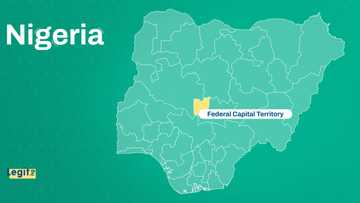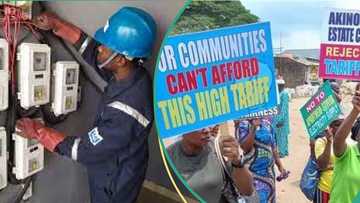Have PVC, Know Your Polling Unit and Other Simple Tips You Need To Vote in Imo, Bayelsa, Kogi
Legit.ng journalist Esther Odili has over two years of experience covering political parties and movements
CHECK OUT: Education is Your Right! Don’t Let Social Norms Hold You Back. Learn Online with LEGIT. Enroll Now!
Nigeria - In a few hours from now, Bayelsa and Imo states residents will elect a new governor, on Saturday, November 11, 2023, as the Independent National Electoral Commission (INEC) conducts the states’ off-season governorship poll.

Source: Facebook
Major requirements needed to vote successfully
The states are three of six states in Nigeria with off-cycle governorship polls. Others on the line are Ondo, Edo and Osun states.
While the current governor of Imo state’s term expires on January 14, 2024, Okoye said the governors of Kogi and Bayelsa states had respective terms that expire on January 26, 2024, and February 13, 2024.

Read also
‘We are looking for’: FIRS announces fresh recruitment for young graduates, lists requirements

Source: Facebook
Ahead of the big day, INEC released some guidelines that will enable eligible voters to vote successfully:
Who is a voter?
A voter is a person who has the right to participate in an election by an elector. In Nigeria, a voter is a citizen who is 18 years old and above, is duly registered and whose names and details are in the register of voters. In effect, anyone who can exercise the right to vote is a voter.
To be registered as a voter, an individual must be:
- A citizen of Nigeria;
- Has attained the age of eighteen (18) years;
- Ordinarily, resident, work in, originate from the Local Government Area (LGA), Council, ward covered by the registration officers of the Commission for registration as a voter;
- Free from any incapacity to vote under any law in Nigeria;
- Present him/herself to the registration officer of the Commission for registration as a voter; and
- Must not be subject to any incapacity to vote under any law in Nigeria.
Who is allowed (eligible) to vote?
To vote in the elections, one must:
- Be a Nigerian citizen.
- Be 18 years and above.
- Possess a Permanent Voter Card (PVC)
- Be in the Register of Voters where he/she is assigned to vote
AGE (18 Years and above)
A Nigerian allowed to exercise their franchise during the November off-season elections will be 18 years and above.
Remember: Voters who do not possess PVC will not be accredited and, consequently, will not be able to vote.
Time to get to your polling units (voting hours)
On each election day, polling stations will open for accreditation and voting from 8:00am to 2.00pm. However, voters on the queue before the close of the poll at 2:00pm will be accredited and allowed to vote.
Important: No person will be allowed to vote at a polling unit other than the one where he/she registered and got accredited.

Read also
US election 2024: Donald Trump visits McDonald's as Kamala Harris goes to churches, videos trend
What is the voting procedure?
Voting at the polling unit will be as follows:
- At the polling unit, join the queue. An INEC official will check if you are at the correct polling unit and confirm that the PVC presented belongs to you.
- An INEC official will confirm if your PVC is genuine using the card reader. You will be asked to place your finger on the card reader.
- An INEC official will ask for your PVC and confirm you are listed in the Voters Register. Your name will be ticked and your finger will be inked to confirm you have voted. If your name is not found you cannot vote.
- The Presiding officer will stamp, sign and endorse your ballot paper. You will be given the ballot paper rolled with the printed side inwards and directed to the voting cubicle.
- Stain your finger with the ink given and mark the box for your preferred candidate/party. Roll the ballot paper in the manner you were given and flatten it.
- Leave the voting cubicle and drop the ballot paper in the ballot box in full view of people at the Polling Unit.
- Leave the Polling Unit or wait if you so choose, in an orderly and peaceful manner, to watch the process up to declaration of result.

Read also
“Soludo's sack date has been fixed”: APC chieftain reacts as INEC announces date for Anambra guber election
N.B The result of each Polling Unit shall be pasted at the unit for everyone to see.
What is the accreditation procedure?
- The Presiding Officer (PO) at the polling unit will:
- Allow voters into the polling unit in an orderly queue.
- Where culture disallows men and women mingling on a queue, create separate queues for men and women.
- Introduce polling agents and poll officials present, including the Asst. Presiding Officer (APO) I who will:
- Request the voter to present his/her PVC,
- Read the PVC using the Card Reader, and
- Request the voter to place the appropriate finger on the Card Reader for authentication.
- On being authenticated, the voter will present himself/herself to APO II who will request for his/her PVC,
- Check the Register of Voters for the records of the voter,
- Tick as appropriate on the Register and apply indelible ink on the specified finger of voter’s left hand, and
- Issue the voter an accreditation tag
PVC (Have a Permanent Voter’s Card)
Only individuals who register and present a valid Permanent Voter’s Card (PVC) at their polling units will be eligible to vote at the election.
Only those with their PVC authenticated using the BVAS device (fingerprint or facial recognition) can vote. NO PVC, NO VOTING!
Know your Polling Unit (PU)
You will only be allowed to vote in the polling unit where your name is enlisted in the voters register.
How to confirm your PU
According to INEC, there are two ways for voters to confirm their polling unit, either through SMS or the commission's website.
To check through SMS, a voter is required to;
Text their voting states, last name and the last six digits of their Voter Identification Number (VIN) to any of the lines– 09062830860, 09062830861, for example, FCT Magaji 445322.
Polling Unit will open at 8:30 am and close at 2:30 pm or when the last person in the queue votes on or before 2:30 pm. This means that all eligible voters in the queue as of 2:30 pm will be allowed to vote.
can I bring my phone to the polling unit?
No, phones are prohibited in the polling booth.
What is BVAS?
BVAS is an electronic machine called the Bimodal Voter Accreditation System (BVAS). It is used for voter verification and authentication to confirm a voter's identity using either their fingerprints or face. The BVAS will be used for the November polls, INEC said.
Significance of the BVAS
The BVAS and any other electronic device INEC uses at elections have been backed by the Electoral Act 2022.
It ensures that only persons eligible to vote and possessing their PVCs and whose names are on the register of voters of a particular polling unit are allowed to vote at that polling unit and can only vote once.
Important note: When casting your vote, make sure you thumb-print in only one box: the box of your chosen party.
Other important thing s to know on election day
What are the election day offenses?
According to INEC guidelines, no person shall on Election Day do any of the following in the polling environment:
- Campaign for votes, or persuade a voter not to vote for a candidate;
- Shout slogans concerning the election, or in support of any party
- Be in possession of an offensive weapon or wear any apparel calculated to intimidate voters;
- Use a vehicle bearing the color or symbol of a political party or candidate;
- Loiter without lawful excuse after voting or after being refused to vote;
- Snatch or destroy any election materials; and
- Blare siren.
How to report vote-buying and election offences
Report election offences to the INEC situation room on election day. The number to reach the situation room will be communicated to the public before the election day.
You can also download the myINEC App for the Google Play Store and report incidents to the Commission.
Ohanaeze advises Imo people on who to vote for
Earlier, Legit.ng reported that Ohanaeze Ndigbo advised Imo citizens to vote for any candidate of their choice in the Saturday, November 11, governorship election in the state.
Speaking to newsmen in Owerri on Thursday, November 9, the Imo state capital, the president of the group, Chief Iwuanyanwu, maintained that Ohanaeze Ndigbo was non-partisan and, therefore, had no preferred candidate.
He urged Imo residents to ignore the sit-at-home order and come out en masse to perform their civic rights.
PAY ATTENTION: Сheck out news that is picked exactly for YOU ➡️ find the “Recommended for you” block on the home page and enjoy!
Source: Legit.ng







